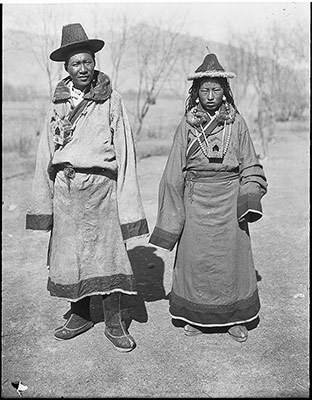
1998.285.312.1 (Glass negative)


1998.285.312.1 (Glass negative)

Rabden Lepcha
Sir Charles Bell
End of March or early April 1921
Lhasa
1998.285.312.1
120 x 163 mm
Negative glass plate gelatin , Negative Half Plate
Donated 1983
St Antony's College, Oxford.
Lantern Tape
Sir Charles Bell's Mission to Lhasa 1920-21
Royal Central Asiatic Society
Rabden Lepcha
H.283
BL.H.283
'The People of Tibet', Sir Charles Bell, Oxford: Clarendon Press, 1928 [view list of illustrations]
Manual Catalogues - Bell's List of Illustrations entry: "[No. of chapter] LI. [Subject of Chapter] Tribes to the East [Subject of Illustration] H.283 (e) Golok man and his wife come to Lhasa for trade; they bring salt, dried meat etc. In their own country they are inveterate brigands. [Remarks] L.261 (Y in L)"
Other Information - Cultural Background: Entry from Bell's diary for 4th April 1921 [pp. 76-77]: ‘Rabden, though at last successful, has found great difficulty in getting the Golokpas [?] to allow him to photograph them. “They are men of power (wang-chem-po)” he says; “When I ask them to let me take their photographs, they refuse curtly, saying that there is no such custom with them”. Palhese tells me that the Golokpas are prosperous as a rule, for besides trading in other districts they gain wealth by robbing outsiders in their own. In Lhasa a Golok man will sometimes snatch something off a stall in the market and make a bolt for it. Such are usually captured, but sometimes effect an escape with their booty. The people of Nya-rong are also much given to robbery, ranking perhaps second among Tibetan tribes in this respect, the Golokpas being first’ [MS 1/6/2004]
Contemporary Publication - Published in 'The People of Tibet', Bell, C. A., Oxford: Clarendon Press, 1928, facing p.142:"Go-lok man and his wife in Lhasa." [MS 10/9/2004]
Other Information - Cultural Background: The Golok region of Tibet lies to the extreme east of Lhasa adjoining the Amnye Machen mountain range. In "Portrait of the Dalai Lama", Bell comments that Golok means, "head turned round, i.e. 'a rebellious people'", but that "these men of Golok who rob travellers and even caravans passing through their own country, come to Lhasa and other parts of Tibet as semi-peaceful traders, who are tolerated as such." (p. 285) The couple pictured may well have visited Lhasa to trade, but the fact that they wear their best long-sleeved 'Chuba' (gown) and 'gau' (amulet boxes) also indicate that their journey was a pilgrimage. [CH, 03/04/2000]
For Citation use:
The Tibet Album.
"Golok man and his wife"
05 Dec. 2006. The Pitt Rivers Museum.
<http://tibet.prm.ox.ac.uk/photo_1998.285.312.1.html>.
For more information about photographic usage or to order prints, please visit the The Pitt Rivers Museum.
© The Pitt Rivers Museum